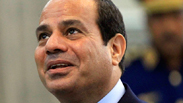
Only Egypt can end the fighting
Analysis: Israel's intelligence community sees Cairo as only real platform capable of influencing Hamas.
But there is one thing we can all agree on: The news about a ceasefire will come from one place only – Cairo.
The common estimate among the decision makers is that the Egyptians are the only ones who can end the fighting. The Egyptian capital serves as what the intelligence community defines as "the only real platform which has the greatest amount of influence on Hamas."
In other words, while Quartet envoy Tony Blair and European diplomats are hopping from one Middle Eastern capital to another in an attempt to create a ceasefire, Jerusalem understands that the Egyptians are the only ones capable of "delivering the goods."
But Cairo also has a score to settle with Hamas due to the extensive ties between the terror organization and Mohamed Morsi's Muslim Brotherhood. As a result, the relationship between them is filled with suspicion and hostility. Hamas sees the Egyptians as biased mediators and is convinced that the Egyptian regime is dragging its feet in a bid to let Israel continue crushing the Strip.
Israel, on the other hand, has faith in the mediation abilities of Egyptian President Abdel Fattah al-Sisi and his people. Prime Minister Benjamin Netanyahu is holding indirect negotiations with Hamas, and this isn't the first time. It's possible that at the end of the negotiations he will be asked to agree to lift the naval blockade of Gaza – a concession he might not be able to accept.
In spite of all the spins of the past few days about suggestions to demilitarize the Strip or a 10-year "hudna" (truce), most of them are baseless. This means that we must be well prepared for the next round of fighting because it is unlikely that we will succeed, at least in the current format, to achieve anything beyond a reenactment of the understandings reached following Operation Pillar of Defense.
Hamas still has many rocket arsenals. Although the organization has suffered greatly in the 10 days of fighting, its offensive abilities have not changed. Nonetheless, there is no doubt that it is strategically isolated and in a state of distress.
In the meantime, the Israel Air Force is continuing its strikes in Gaza, but what we are missing now is a "diplomatic bank of targets" which will define the operation's goals.
The operation began with a promise that "calm will be met with calm." Then they began talking about demilitarizing the Strip. Now the political echelon is talking about dealing Hamas a critical blow. If a ceasefire is not reached soon, it's only a matter of time before they come up with a new goal.










